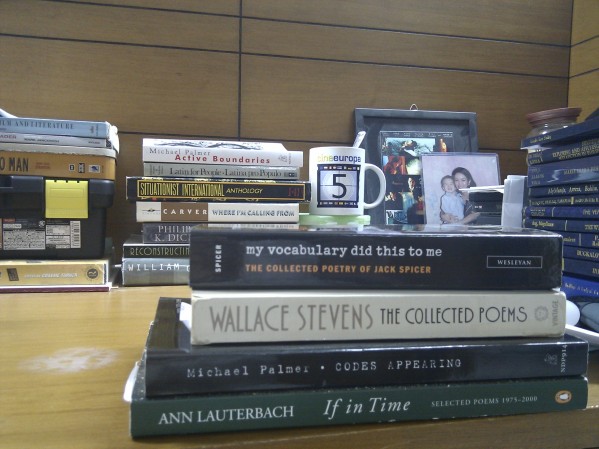I’m pretty sure I’ve read a blog entry from Cahiers de Corey before, but I can’t remember which. I promised myself I’d regularly catch up with the Arcadia Project Web site set up to supplement the 600-page anthology of “North American Postmodern Pastoral” Corey edited with G. C. Waldrep, but I haven’t done so. And I’ve definitely read Corey’s essay on Richard Hugo before (I’m re-reading it now), because of the sentences from it that stick:
- “More nakedly than any American poet I know of, Hugo writes about the task and function of poetry from a position of sheer abjection.”
- “…Hugo also implicates the reader in his vision of the poet as awkward failure.”
- “…any poet, even the most successful, is likely to feel herself an outsider in a culture where most literate people are cheerfully oblivious to poetry…”
- “That need, that state of abjection, is Hugo’s given, and if you take it as your own, he can teach you how to write a poetry that transcends your inadequate self.”
- “Read at the right angle, The Triggering Town can help bridge the gap that now yawns so wide between a poetry of subjectivity and a poetry that foregrounds the operations of language, that seeks to demonstrate the fragile constructedness of our selves and the world.”
But I’ve never actually read Corey’s poems before this morning. Big mistake.
I like how News of the Blazing World” opens with “This is the church of Aspartame,/ caffeine, nicotine, and winter through// that window, stripping branches bare,” and ends with “He imagines a world/ as a king might, scientifically// from kingdom to phylum to species,/ from general death to the life of the concrete.”
Here’s another great opening, from “A Fine Romance”:
I can explain: the sea is not ice. It is a salinity that resists
slippage, that cannot thaw or be resolved,
that will not stalk its own surface,
that can’t extratheistically transform its peculiar substance
without alluding to buggery, misconduct, pandered memory
Here’s another great ending, from “Cognitive Deficit Market”:
The skin is a glove that wrinkles as it tightens.
The cerebellum’s the same. A game
of chess between walking sticks—I mean the insects
made up to resemble wood. I say we dissemble
from photos and repetition
our stakes in these weightless names.
And here’s a great middle from “Stage Blood on the Mouths of the Eumenides” (which appears with another poem called “Dissolved Soviet”):
Press star seven seven for additional privacy.
Press star pound star to disappear utterly.And reappear at a pinched cry from an alley—
The map unfolds in traffic.
Context requires wrinkles,
even digital context. Context
is one of the slower-deploying
airbags.
I think I’d like to pick up Severance Songs (be sure to download the PDF of the “study guide” linked on that page), his collection of quasi-sonnets. Samples can be read from that link, and there’s another here (“Yours the face aglow in the cold,/ precarious thriver in the song-stung dark./ With glance and lip you collected me.”) and here (“Put on your hat and gloves, it’s poignant out./ Carry your own chill separate from the air’s.”).
The one I like best is the one from this review, a poem alluding to Icarus, William Carlos Williams, Led Zeppelin, Walter Benjamin’s angel of history, Yucca Mountain, etc. BRILLIANT.




